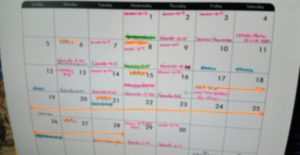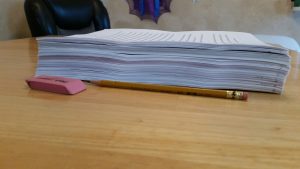 I like my schedules. Whenever we change the clocks, I don’t feel right for days. This week, my daughter woke up at 4:45 AM Monday with a cold and fever, and didn’t go back to sleep. Monday lasted for about 2 days. Plus, since she didn’t go to school, it messed up my weekly work schedule. Finally, Wednesday was the last day of school this week, so I spent the day thinking it was Friday.
I like my schedules. Whenever we change the clocks, I don’t feel right for days. This week, my daughter woke up at 4:45 AM Monday with a cold and fever, and didn’t go back to sleep. Monday lasted for about 2 days. Plus, since she didn’t go to school, it messed up my weekly work schedule. Finally, Wednesday was the last day of school this week, so I spent the day thinking it was Friday.
Humans are creatures of habit. A million little things can derail our comfortable routines. When anything knocks us off the rails, it can make us irritable or anxious or leave us feeling unfocused.
This got me thinking about our characters. They have their routines, too. Having something disrupt their day is a great way to add tension great and small.
Not getting their morning coffee can make them angry, which perhaps makes them mishandled a situation, which leads to further unhappy consequences. A larger incident, such as a car accident, can change their whole world.
Inciting incidents are the ultimate shakeup of our character’s schedule. It alters their world in such a way that they can never go back to their comfortable cocoon.
The one that comes immediately to mind is from Star Wars: A New Hope. Luke Skywalker’s routine is broken when he has to hunt down runaway R2D2. As a result, he is not home when the stormtroopers murdered his family. With nothing left to keep him on Tatooine, he embarks on his adventure to the stars.
Knowing how discombobulated even a minor change in schedule leaves me, I want to make sure my characters display a similar disorientation in proportion with the incident they are facing. Too often protagonists seem to take such shakeup in stride, which makes them less realistic and less relatable. So I want to work on that in my characters.
Meanwhile, I am waiting for my internal clock to readjust.




Slimming Down the Ending
Then I got to the end, which is too long. I knew it was too long when I sent it in, but I didn’t want to believe it. After all, tightening my work is hard and everything I wrote is so perfect and necessary, right? I blame editing fatigue.
So now I’m at the end, and I need to cut about 40 pages from the 64 that currently exist. Kathryn suggested many cuts, but I cannot cut everything she suggested, because I need some of it to set up future books. So how am I going to do this?
1) I’m going to highlight all the information I need to retain and number each.
2) I’ll put each number and a short reminder of what it is into an Excel sheet so I can see all of the pieces at once.
3) I will then see what information can be woven into existing scenes that I will be keeping and what information might be combined into new scenes.
4) As I put that information into the story, I will mark it in the spreadsheet so I don’t accidentally leave anything out.
5) When I have done all that, I will whisper an invocation to the goddess of writing and chocolate and hope the page count is okay.
6) If it’s not, then I will go back and try again until I get it right.
That’s my plan for yanking 40 pages out of my denouement. I will report back once I have completed the process.
Do you have a specific process when you need drastic cuts to your manuscript?